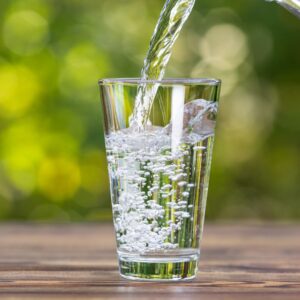Updated: February 29, 2024
You’ve probably heard that drinking more water will help you lose weight, and it’s true! Drinking water helps boost your metabolism, cleanse your body of toxins and waste, and acts as a natural appetite suppressant to aid in weight loss.
When on a wellness and weight loss program, drinking water is one of the most important things you can do. On the CardioMender, MD Wellness and Weight Loss Program, 128 ounces of fluid are recommended, at least half of which should be water. A general recommendation is to drink eight 8-ounce cups of water per day, for a total of 64 ounces. However, actual fluid needs are affected by diet, physical activity, body composition, and climate.
Does Drinking Water Increase Metabolism?
Metabolism is the rate at which your body converts what you eat and drink into energy. The faster your body does this, the more calories you burn “at rest,” meaning without doing any sort of exercise. While parts of your metabolism are determined by genetics and age, there are a few things you can do to boost your metabolism and lose weight, like drinking water.
In this video from Nutrition Facts, nutrition expert Dr. Michael Greger shared that one study revealed that drinking 500 ml of water increased metabolic rate in both men and women by 30%, making it the safest, simplest, and cheapest way to boost your metabolism. Drinking cold water may further enhance water’s calorie-burning benefits because the body expends energy by heating up the water for digestion.
Does Drinking Water Reduce Belly Fat?
Water plays a direct role in our body’s ability to burn fat. The process of breaking down fat, known as lipolysis, requires water. The first step in lipolysis is called hydrolysis, which essentially adds water to fat to break it down. Without the presence of water, it would be physically impossible for our bodies to break down fat.
So-Called ‘Diet Beverages’ Cause Cravings and Weight Gain
Studies have shown that non-nutritional sweeteners do cause increased cravings, weight gain and are responsible for many people developing Type-2 Diabetes. Dr. Michael Greger says that studies showing overweight and obese individuals that replaced diet beverages with water lost significantly more weight. Next time you have to choose between a sugary drink and water, choose water. It’s little changes like choosing water over soda that can help you reach your weight loss goals.
Does Drinking a Lot of Water Suppress Appetite?
If you have a goal of eating healthy or losing weight, you may want to consider foods and beverages that help control your appetite, and increasing water intake is the perfect place to start. When the stomach senses that it is full, it sends signals to the brain to stop eating. Water can help take up some space in the stomach, leading to a feeling of fullness, which can help you eat less.
A study published in 2016 looked at the link between dehydration and obesity and found that adults who were not adequately hydrated had higher body mass indexes (BMIs). Another study showed that drinking water before breakfast reduced the number of calories consumed during the meal by 13%.
Water Can Reduce Overall Liquid Caloric Intake
If your favorite soda and water were right next to each other in the fridge, which one would you grab? Most of us are guilty of choosing the worse option: soda. It is easy to accumulate liquid calories by drinking soda, juice, or sweetened coffee and tea.
Water Helps Remove Waste From The Body
Toxins are a normal part of the body’s intake of food and oxygen. The body can naturally detoxify itself through its lungs, liver, and kidneys. However, when our bodies become bombarded with unfamiliar toxins or cannot eliminate them effectively, the toxins can build up and cause health problems. The best way to prevent this is by drinking water.
Water flushes toxins and waste from the body and transports nutrients to where they are needed. Water helps the kidneys filter out toxins and waste while retaining essential nutrients. When waste builds up in the body, people may feel uncomfortable, bloated, swollen, and tired. Unfortunately, bloating can add extra inches to a person’s waist. Staying well-hydrated is a good way to avoid retaining toxins and waste.
Tracking Your Daily Water Consumption
Many people have trouble keeping track of their daily water intake. As a solution, we suggest putting a free water tracking app on your smartphone, such as Aqualert, or getting a large water bottle and determining how many bottles you need to drink each day to meet your goal.
Metabolic Benefits and Source of Antioxidants from Green Tea and Matcha
If water isn’t your cup of tea, then these may be. Both green tea and matcha have many benefits that can help aid in weight loss.
Matcha 
Matcha is a type of green tea made by taking young tea leaves and grinding them into a bright green powder. This powder can also be used to flavor and dye foods. A major health benefit of matcha is that it delivers a mega-dose of antioxidants in every sip or bite (however you decide to consume it). Matcha contains a unique, potent class of antioxidants known as catechins. Daily matcha can help restore and preserve the body’s integral well-being and balance. Check out Doc’s Healthy Matcha Latte recipe here!
Green Tea
Green tea also contains the antioxidant, catechin. Research suggests that catechin can help speed up metabolism by helping break down excess fat and increase the amount of energy the body uses.
Love the metabolic benefits and source of antioxidants from green tea and matcha, but hate the taste? Check out CardioMender, MD’s Metabolic Lean supplement, a novel weight management formula that includes three branded and clinically-studied ingredients – Meratrim™ plant extract, Capsimax™ capsicum extract, and Zychrome® chromium complex. This special combination of ingredients may improve lipolysis (fat breakdown), thermogenic activity (fat burning activity), and insulin function†.
By drinking water, incorporating physical activity, and eating nutritious foods, you’ll be one step closer to creating a healthier version of yourself.
† These statements have not been evaluated by the Food and Drug Administration. This product is not intended to diagnose, treat, cure, or prevent any disease.






